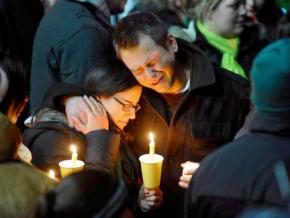Hidden tragedies in every city
, an emergency room nurse at Chicago's largest public hospital, considers the terrible toll of violence--in many different forms--in a capitalist society.
MY FIRST reaction to hearing about the school murders in Newtown was to stop listening to all news.
I was at work, and as co-workers updated each other about the latest rumors and speculation about the number of dead children and who had committed this atrocity, I steered clear of any conversations. As a parent of a 5-year-old, I can't even imagine the horror of losing a child from any cause, let alone random violence--or, maybe worse yet, not knowing yet if your child was among the dead.
The next day, when I could look at a couple news websites, the second headline on the Chicago Tribune's site read: "10 shot, including 4 teens, Friday afternoon and night." While no one died from those shootings in Chicago on Friday, 470 have been murdered in this city this year, as of early December. Simple arithmetic reveals that the same number of people killed at Sandy Hook Elementary School have died in Chicago every three weeks over this year.
Think about these two tragedies side by side. One is the focus of national and international attention, and deservedly so--but the other, though reported with regularity weekly in the local press, receives about as much attention as the weather forecast.

I work as a nurse in the Emergency Department of a large urban hospital, which is next door to the Trauma unit, and almost every weekend morning when I'm on, I walk through crowds of family members attempting to cope with the loss of a loved one or anxiously waiting to hear about the extent of the damage and what future awaits these mostly young people.
Soon after I started working here, I was asked if I wanted to transfer to Trauma, because I would learn a lot as a nurse. While this may have been true, seeing the blank stares of the nurses that work over there every day has convinced me that I made the right decision to stay where I am. Seeing young people come in every day, many not surviving their first hours, and working to do all you can to save them must have an effect on how you view humanity after a while.
If this weekly carnage was taking place in the affluent suburbs of Chicago, there would be National Guard troops on every corner of those oak tree-lined streets, protecting the children of the neighborhood. Instead, when the shootings of Chicago are even discussed, it's implied that the people of the neighborhoods--and even the victims themselves--are to blame. When 7-year-old Heaven Sutton died in crossfire this summer, Mayor Rahm Emanuel responded, "It's not about crime, it's about values."
AS MORE information surfaces about the shooter in Connecticut, there are some reports that he suffered from mental illness. Anyone who can take one child's life after another is clearly insane.
But what about hundreds or thousands or hundreds of thousands of dead children in conflicts around the world? In these cases, the killers are some of the most powerful people and institutions in the world--like the Israeli army murdering Palestinian children, or the Pentagon's drone attacks that kill Pakistani children, or former Secretary of State Madeleine Albright, who once responded to a question about the half million Iraqi children who died as a result of U.S.-imposed sanctions: "We think the price is worth it."
From one parent to another, I can appreciate Barack Obama's words of condolence regarding these murders (I can't excuse his foreign policy, needless to say). But the solutions being put forward are narrow at best.
Gun control is a good example. On the same day as the mass murder in Connecticut, 22 primary school children and one adult were wounded in a knife attack in Henan province in central China. There was a spate of similar attacks on children in 2010, in which 20 died and 50 were wounded over the course of a year. You cannot purchase a gun in China, and most police don't even carry them. Since this attack, regulations on knife purchases in China have clearly not prevented such violence.
Our entire society is sick, which is reflected in the acceptance of children dying on an international scale every day. And this isn't even to mention the suffering and trauma suffered by children raised in poverty. Given all the damage inflicted on people, it's impressive that more atrocities don't take place.
Most people suffer in silence every day, and those who don't, find other avenues, such as drugs, alcohol or abusing others around them. Every day, people come to the hospital where I work with health problems--and many of them with mental illnesses as well. Yet Mayor Emanuel has closed half of the public mental health clinics in the city.
People who have been receiving counseling for depression related to the loss of a loved one from violence or some other cause now have to travel even further for help. These people are already at high risk for hurting themselves or others around them, but it's clear that those who run this city aren't concerned about the inevitable consequences of these cuts.
For poor people with mental health issues--and their numbers are disproportionate to the overall population--those who have it together enough to make it in to see a doctor enter a revolving door of ineffectual drugs with terrible side effects, perhaps followed by several days in a state-run mental health facility and then back to the streets to start again.
There is no effort or interest in figuring out why so many people have mental health problems--because if the real cause were to be discovered, it would be an indictment of the capitalist system. We know the 1 Percent aren't interested in upsetting their order with such discoveries--so it's up to us to get on with that project.


